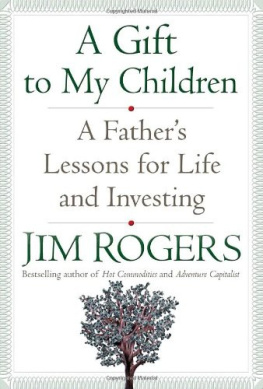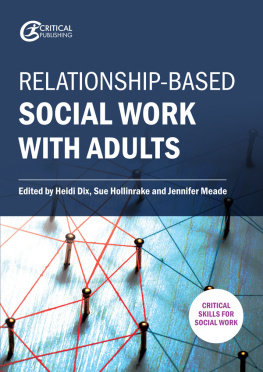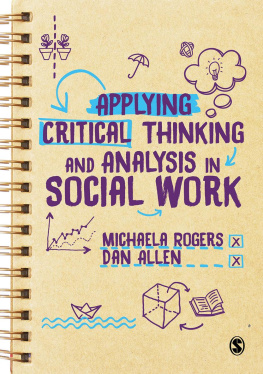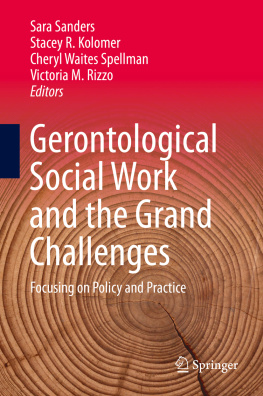Social Work with Adults
SAGE was founded in 1965 by Sara Miller McCune to support the dissemination of usable knowledge by publishing innovative and high-quality research and teaching content. Today, we publish more than 850 journals, including those of more than 300 learned societies, more than 800 new books per year, and a growing range of library products including archives, data, case studies, reports, and video. SAGE remains majority-owned by our founder, and after Sara's lifetime will become owned by a charitable trust that secures our continued independence.
Los Angeles | London | New Delhi | Singapore | Washington DC
Social Work with Adults
- Jim Rogers
- Lucy Bright
- Helen Davies
Learning Matters
An imprint of SAGE Publications Ltd
1 Oliver's Yard
55 City Road
London EC1Y 1SP
SAGE Publications Inc.
2455 Teller Road
Thousand Oaks, California 91320
SAGE Publications India Pvt Ltd
B 1/I 1 Mohan Cooperative Industrial Area
Mathura Road
New Delhi 110 044
SAGE Publications Asia-Pacific Pte Ltd
3 Church Street
#10-04 Samsung Hub
Singapore 049483
2015 Jim Rogers, Lucy Bright, Helen Davies
First published in 2015
Apart from any fair dealing for the purposes of research or private study, or criticism or review, as permitted under the Copyright, Designs and Patents Act, 1988, this publication may be reproduced, stored or transmitted in any form, or by any means, only with the prior permission in writing of the publishers, or in the case of reprographic reproduction, in accordance with the terms of licences issued by the Copyright Licensing Agency. Enquiries concerning reproduction outside those terms should be sent to the publishers.
Library of Congress Control Number: 2015946649
British Library Cataloguing in Publication Data
A catalogue record for this book is available from the British Library
ISBN 978-1-4739-0755-3 (pbk)
ISBN 978-1-4739-0754-6
Editor: Kate Wharton
Development editor: Lauren Simpson
Production editor: Chris Marke
Copy editor: Diana Chambers
Proofreader: Sue Edwards
Marketing manager: Tamara Navaratnam
Cover design: Wendy Scott
Typeset by: C&M Digitals (P) Ltd, Chennai, India
Printed in Great Britain by Henry Ling Limited at The Dorset Press, Dorchester, DT1 1HD
About the Authors
Jim Rogersis a senior lecturer in health and social care at the University of Lincoln. He completed professional training as a mental health nurse and worked in that capacity for over twelve years in a range of hospital and community settings. He now co-ordinates the institution's training programmes for approved mental health professionals and best interests assessors. He has conducted research on the Deprivation of Liberty Safeguards with care homes in the region and has a strong interest in issues relating to mental health and mental capacity. Jim co-wrote a text for Learning Matters
Social Work in a Digital Society and has also published academic work relating to complementary therapies, social work and gambling problems, and personal health budgets.Lucy Brightcompleted her Masters/Diploma in Social Work in 1993. Since then she has worked in a wide variety of social work settings with adults, as well as spending four years working for a solicitor and specialising in mental health law. Lucy currently works as a best interests assessor and has a particular interest in the Deprivation of Liberty Safeguards and how these have been working in practice since their implementation in 2009.Helen Daviesqualified as a social worker in 1986 and has taught social work students since 1999, while continuing in practice in statutory and voluntary services with adults with learning disabilities. As one of four social work co-ordinators at the Independent Living Fund, she led its work in Wales and Northern Ireland. Helen's current role as senior lecturer at the University of Lincoln includes supporting students to make constructive links between theory and practice.
Acknowledgements
Authorship is often perceived as a solitary endeavour, but it is rarely so. In the case of a co-authored book such as this, debates, discussions and critique of material throughout the gestation period have helped the three of us arrive at something we hope is greater than the sum of three individual parts.
We are grateful to each other for the support during the challenges this process involved. We also wish to express gratitude to colleagues in the worlds of both education and practice who have discussed issues and cases, and stimulated our thinking in relation to the issues in the text. Equally, we are grateful to the many students, on both our undergraduate and post graduate courses, who have engaged with, discussed, and written about these issues.
Helen would like to dedicate this book to Bill and Elsie Davies, appreciatively; Lucy to the service users who have informed and inspired her; and Jim to his family for support and wise guidance.
Chapter 1 Introduction
Whether you are a student in an educational setting or on placement, a newly qualified practitioner, or an experienced practitioner in adult social care, you will no doubt be well aware of the prominence of debates about best interests, about vulnerability and about safeguarding. It is likely that you will have experienced some level of training and debate about these issues and on the subject of mental capacity. You may have also had recent training in relation to the new Care Act 2014 and your workplace may be in the process of beginning to implement that Act and understanding all of the ramifications of it.
The themes noted above are often highlighted as the most important in current adult social care. They were highlighted in the new Knowledge and Skills Statement (KSS) for Adult Social Work which was published in 2015, and local authorities have stated that these are the key areas of skills and knowledge which they consider when recruiting adult social care practitioners.
Tensions and challenges in relation to balancing the need to protect those who are vulnerable in society with the impetus to empower and promote independence have been a constant feature in the history of social work. The current debates and complexities which can arise in relation to safeguarding vulnerable adults and those who lack capacity to make decisions for themselves, while promoting their best interests, can be seen as a new variation on this recurring theme.
Our aim in producing this text was to find a way of elucidating, linking and clarifying these issues in a way that might help those who need to navigate the messy difficulties of practice.



















